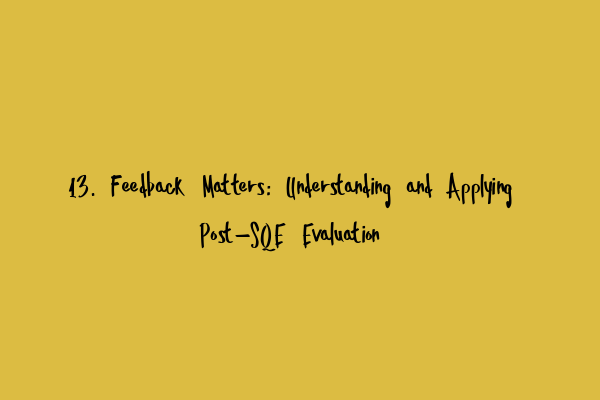13. Feedback Matters: Understanding and Applying Post-SQE Evaluation
Welcome to SQE Exam Law, where we provide comprehensive resources and strategies to help you succeed in the Qualified Lawyers Transfer Scheme (QLTS) Solicitors Qualifying Examination (SQE) assessments. In this blog post, we will delve into the crucial topic of post-SQE evaluation and why feedback matters for your success. By understanding and applying effective feedback strategies, you can enhance your performance, identify areas for improvement, and achieve your goals.
The Power of Feedback
Feedback is a powerful tool that can shape and mould your skills, knowledge, and approach to tackling the SQE assessments. Whether you are preparing for SQE1 or SQE2, receiving feedback allows you to gain insights into your strengths and weaknesses, enabling you to focus your efforts on areas that require improvement.
At SQE Exam Law, we understand the significance of feedback in the learning process. That’s why we encourage all our students to seek and embrace feedback from a variety of sources. Taking an active role in seeking feedback, whether it’s from mock tests, practice papers, or mentors, can provide you with valuable guidance that helps you refine your exam techniques and boost your confidence.
Receiving feedback from experienced professionals who have a deep understanding of the SQE can offer you valuable insights and advice. It can uncover blind spots, highlight patterns in your performance, and suggest tailored strategies to help you achieve your goals. In essence, feedback is the bridge that connects your current performance to your desired improvements.
Strategies for Applying Feedback
Now that we understand the significance of feedback, let’s explore some strategies for effectively applying feedback to enhance your SQE performance:
- Embrace a Growth Mindset: Approach feedback with an open mind and a willingness to learn and improve. Embracing a growth mindset allows you to view feedback as an opportunity for growth rather than criticism.
- Identify Themes and Patterns: Look for recurring themes and patterns in the feedback you receive. Are there specific areas where you consistently receive constructive critique? Identifying these patterns gives you a clear direction on where to focus your efforts.
- Set SMART Goals: Based on the feedback you receive, set Specific, Measurable, Achievable, Relevant, and Time-bound (SMART) goals. SMART goals help you create a roadmap for improvement and provide a tangible way to track your progress.
- Develop an Action Plan: Create an action plan that outlines the steps you will take to address the feedback and achieve your goals. Break down your plan into manageable tasks and allocate specific timeframes for each task.
- Seek Guidance and Support: Reach out to mentors, tutors, or study groups for guidance and support. Discussing your feedback with others who are on the same journey can offer new perspectives and strategies.
By applying these strategies, you can turn feedback into a powerful ally on your SQE journey, accelerating your learning and growth.
Conclusion
Feedback is an essential component of your SQE preparation. It provides valuable insights into your performance, helps you identify areas for improvement, and guides you towards success. By embracing a growth mindset and applying effective feedback strategies, you can turn feedback into a catalyst for your SQE exam success.
For more resources and strategies to enhance your SQE preparation, check out our related articles:
- Mastering Time Management in SQE: Strategies for Efficient Exam Completion
- Conquer the Multiple Choice Questions (MCQ) in SQE1
- Mastering Effective Revision Techniques for SQE Success
- Interactive mock tests for SQE: Enhancing engagement and learning
- SQE Sample Papers: Practice for Exam Success
Remember, at SQE Exam Law, we are dedicated to supporting you throughout your SQE journey. Stay tuned for more valuable insights and guidance to help you achieve SQE success!
